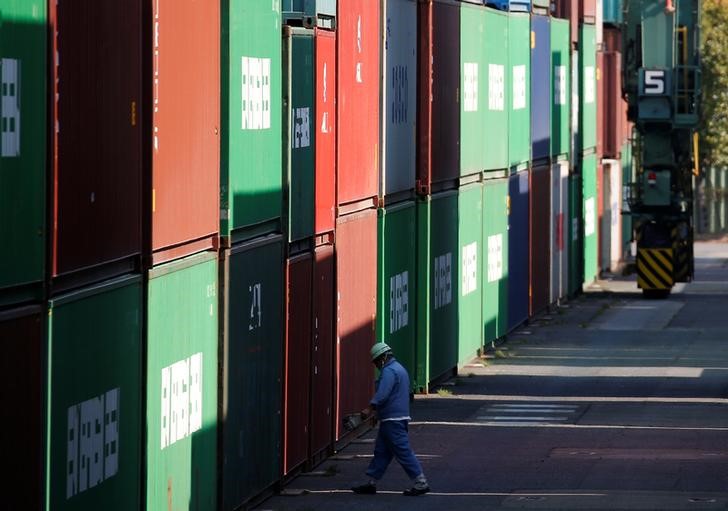
A worker walks between shipping containers at a port in Tokyo, Japan, March 22, 2017. REUTERS/Issei Kato/File Photo
August 16, 2018
By Tetsushi Kajimoto
TOKYO (Reuters) – Japan’s export growth slowed more than expected in July as shipments to the United States fell for a second straight month, with the automotive sector down sharply as global trade disputes cast doubts over the strength of foreign demand.
Ministry of Finance (MOF) data out on Thursday showed exports rose 3.9 percent year-on-year in July, far below a 6.3 percent increase expected by economists in a Reuters poll. The rise followed a 6.7 percent year-on-year gain in June.
Japan’s exports to the United States fell 5.2 percent year-on-year in July, down for a second straight month, due to a 12.1 percent decline in car shipments.
Imports from the United States rose 11.0 percent in the year to July, led by crude oil, motors and liquefied petroleum gas.
As a result, Japan’s trade surplus with the United States fell 22.1 percent year-on-year to 502.7 billion yen ($4.55 billion).
Exports to China, Japan’s largest trading partner, rose 11.9 percent in July from a year ago, while shipments to Asia, which account for more than half of Japan’s overall exports, rose 8.0 percent.
In terms of volume, which strips out the impact of currency moves, Japan’s exports rose an annual 0.8 percent in July, up for a fifth straight month.
Overall imports rose 14.6 percent in the year to July, roughly matching economists’ median estimate, resulting in a trade deficit of 231.2 billion yen, vastly exceeding the expected 50 billion yen.
Thursday’s trade figures came after gross domestic product (GDP) data last week showed Japan’s economy, the world’s third largest, rebounded in the second quarter from a January-March dip.
However, global trade tensions cloud the outlook for Japan’s export-reliant economy, and market turmoil stemming from some emerging economies may boost the safe-haven yen, undermining the country’s export competitiveness.
U.S. President Donald Trump has made the threat of heavy tariffs a key part of his economic message, lamenting the U.S. auto sector trade deficit, particularly with Germany and Japan.
Analysts say global economic growth is likely to support Japan’s exports, but international trade conflicts are an ever-present risk. The impact on the broader economy from higher U.S. tariffs on Japanese automotive exports would be significant, they say.
Japan’s economy grew at an annualized rate of 1.9 percent in the second quarter on the back of household and business spending, recovering from an earlier contraction.
(Reporting by Tetsushi Kajimoto; Editing by Chris Gallagher and Eric Meijer)
